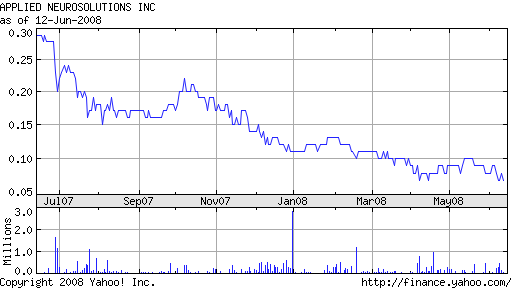Applied NeuroSolutions (APNS), an IL-based firm developing products for the diagnosis and treatment of Alzheimer’s disease (AD), is struggling in penny stock land. Despite steady progress, APNS stock has declined, a trend that might have more to do with bear market skepticism and less with the company’s pipeline. As of March 31st, Applied had $2.5 million in cash on hand.

APNS achieved its Q2 milestone with the development of a serum-based test to support the diagnosis of AD (though it wasn’t clear how much progress was made; the press release might be a cry for broader investor attention).
Last quarter, the company announced that its diagnostic could rule out AD. As a next step, APNS will be collaborating with several (as yet unnamed) companies to develop, by year end, a diagnostic that will both ‘rule out’ and ‘rule in’ AD.
Previously, APNS’ p-tau 231 biomarker (p-tau 231) was shown to be a predictor of the transition from mild cognitive impairment to Alzheimer’s disease; for those living with mild cognitive impairment, a diagnostic that identifies AD before onset would offer the best opportunity for patients to take advantage of available treatment options.
Ellen Hoffing, APNS’s President and CEO, is pleased with the progress and believes the company is, “on track to advance [its] tau based serum diagnostics and achieve an important Q4 milestone.” Provided they can meet the deadline, I’d expect a significant uptick in share price.
Over five million people in the U.S. currently have AD (30 million worldwide). Ten million baby boomers will develop AD in their lifetime. Currently there are more than 50 million people over age 60 in the U.S., and this number is expected to steadily increase due to the aging baby boomer population. According to the company, the availability of a reliable blood test that could be used as an annual screening tool for AD is a market that could exceed $1 billion worldwide.